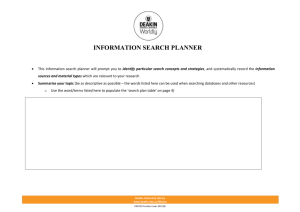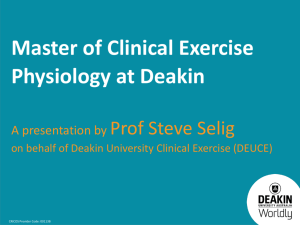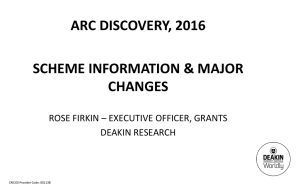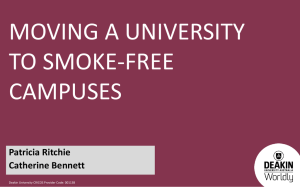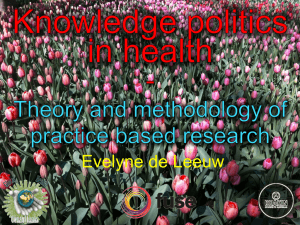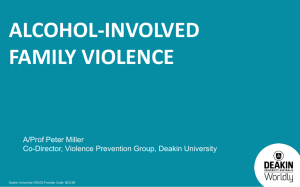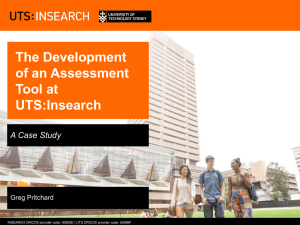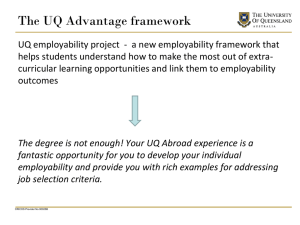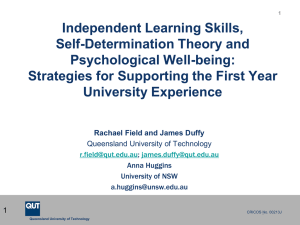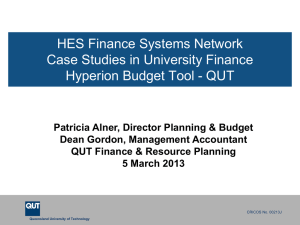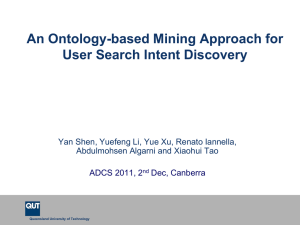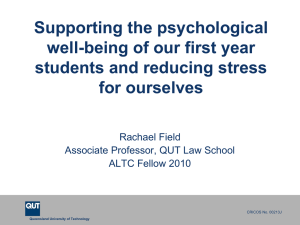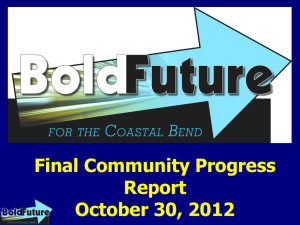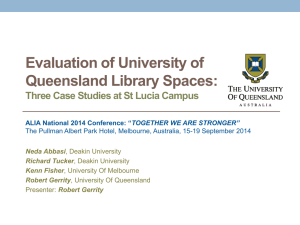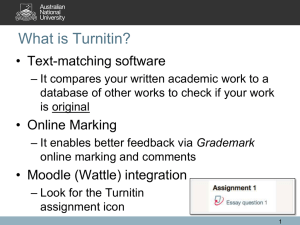Master of Clinical Exercise Physiology course
advertisement
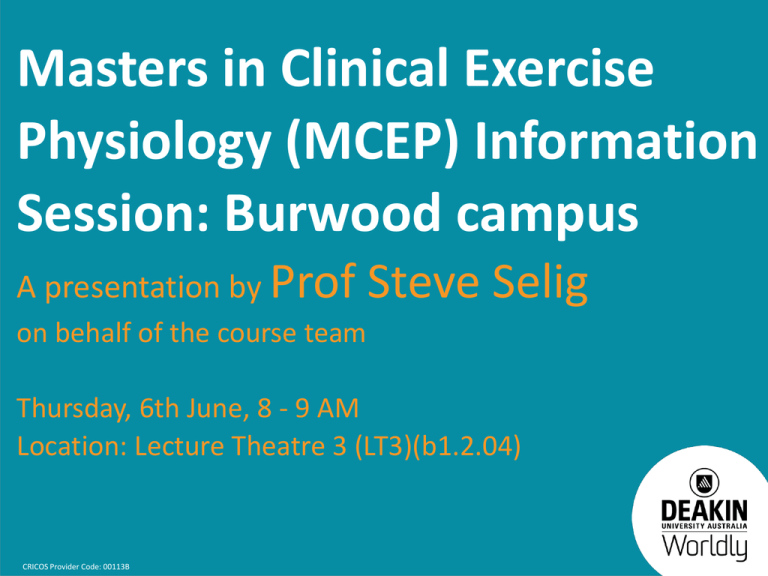
Masters in Clinical Exercise Physiology (MCEP) Information Session: Burwood campus A presentation by Prof Steve Selig on behalf of the course team Thursday, 6th June, 8 - 9 AM Location: Lecture Theatre 3 (LT3)(b1.2.04) CRICOS Provider Code: 00113B Masters in Clinical Exercise Physiology (MCEP) Information Session: Waurn Ponds campus A presentation by Prof Steve Selig on behalf of the course team Thursday, 6th June, 1 – 2 PM Location: REACH Lecture Theatre (dd2.101) CRICOS Provider Code: 00113B The MCEP Course Team Prof Steve Selig, AEP, PhD Dr Steve Fraser, AEP, PhD Dr Natalie Saunders, AEP, PhD Dr Dawson Kidgell, PhD Dr Andrew Dawson, PhD Ms Niamh Mundell, AEP, M.Appl.Sci- Ex Rehab Ms Louise Conway, AEP Ms Alan Wallis, AEP CRICOS Provider Code: 00113B This session is about …. •This lecture/workshop will be presented by Prof. Steve Selig, course director for the Masters in Clinical Exercise Physiology (MCEP). As such this will be particularly interesting and relevant to students taking the ESSA major sequence of the Bachelor of Exercise and Sport Science H343. •During this lecture, Steve will give a presentation about the MCEP degree and provide some examples of case studies as they are taught within the MCEP programme. CRICOS Provider Code: 00113B MASTER OF CLINICAL EXERCISE PHYSIOLOGY (H743): OVERVIEW • FIRST and ONLY clinical exercise course in Victoria to achieve accreditation with Exercise & Sports Science Australia (ESSA); articulated with the ESSA-accredited Bachelor of Exercise & Sports Science (H343) at Deakin • Simple pathway to accreditation as Accredited Exercise Physiologists (AEP) • AEPs are the only exercise professionals in Australia to have access to Provider Numbers with Medicare Australia, WorkSafe Victoria, DVA, TAC, and many other compensable funds and schemes • All students enrol as Commonwealth-Supported Places (CSP), making the course fees amongst the lowest in Australia. Course is 18 months full-time. CRICOS Provider Code: 00113B MASTER OF CLINICAL EXERCISE PHYSIOLOGY (H743): OVERVIEW • The course team has expertise across all of the pathology areas needed for AEP accreditation. • The clinical practicum program covers all of the requirements for AEP accreditation and features the award winning Clinical Exercise Learning Centre at the Burwood campus, where students develop their practice skills under close supervision and mentoring. External placements too. All placements are arranged by Deakin University. • Outstanding levels of teaching excellence, clinical supervision, learning outcomes and employment in the sector. CRICOS Provider Code: 00113B ESSA STREAM IN THE BACHELOR OF EXERCISE & SPORTS SCIENCE (H343) CRICOS Provider Code: 00113B STRONG TRANSITION FROM CLINICAL EXERCISE SCIENCE TO CLINICAL EXERCISE PRACTICE TO WORK Stage of Course Emphasis of Course Trimester 1 Knowledge Clinical Exercise Sciences Pre-Clinical Practice gain knowledge reinforce, refresh and apply knowledge Musculoskeletal Cardiopulmonary Pre-Clinical 1 Exercise Behaviour Trimester 2 Early Application Clinical Exercise Investigations Partial case studies: clinical ex presc reinforce, refresh and apply knowledge Core Graduate Attributes map strongly with this approach Professional Skills practise clinical skills under supervision Clinical Exercise Services Complete case studies reinforce, refresh and apply knowledge Neurological Metabolic Pre-Clinical 2 Clinical 1 Trimester 3 * Clinical 1 * Clinical 2 mentored clinical practice Trimester 1, Yr 2 Work Readiness Clinical Exercise Practice Capstone task Special Populations Interprofessional Learning Clinical 2 Clinical 3: Capstone Tasks graduation Novice Practitioner Practice and Work * Masters Clinical Exercise: 4 Trimesters including a T3 (summer trimester) that is used primarily for clinical placements What does the accredited exercise physiologist (AEP) do? The AEP uses exercise “therapy” to improve clients’: 1. Clinical status (through 10 and 2o prevention, and rehabilitation) 2. Functional status (eg ADLs, fitness) 3. Psychosocial status (anxiety and symptoms of depression, quality of life) Evidence-Based Practice is the cornerstone CRICOS Provider Code: 00113B Why is exercise therapy needed in Australia? and the developed and developing world? CRICOS Provider Code: 00113B Exercise is medicine ….. 1. Medicare Australia (and other national health systems) will be bankrupted by the burden of chronic disease if lifestyle medicine does not supplement conventional medicine. 2. Lifestyle medicine $$ compared to conventional medicine 3. Exercise is a “poly-pill” obesity, insulin sensy, lipids, blood pressure, anxiety + depression, mortality 4. No client ever wants to take another pill or have another operation What are some differences between AEPs and physiotherapists? The important differences between physiotherapists and AEPs are that physiotherapists focus on treating the primary medical condition(s) usually at the acute and post-acute stages, whereas AEPs apply exercise to improve their clients’ chronic clinical, functional and psychosocial status. AEPs draw on an extensive range of high quality evidence to provide clinical exercise services for both the management and prevention of chronic disease. For further information on clinical exercise practice, go to ESSA and Exercise is Medicine® CRICOS Provider Code: 00113B What are some differences between AEPs and physiotherapists? Physiotherapists treat the primary problem, usually an injury, at the acute and early post-acute stages of rehabilitation. AEPs treat the whole person, using exercise and other lifestyle strategies including health coaching. AEPs help people recovering from illness (eg heart attack), injury (soft tissue) or an operation (eg hip replacement), with a goal to helping clients to help themselves to better long term health and fitness (prevention). CRICOS Provider Code: 00113B Do AEPs earn the same as physiotherapists? • Yes, when these health professionals are employed by hospitals. • Both enter their professions at Grade I, with equal salary and status. They can then progress in their careers from there. • The billing charges under Medicare, WorkSafe and other compensable schemes are very comparable for physiotherapists and AEPs CRICOS Provider Code: 00113B CAREERS AS AN AEP • Hospital rehabilitation –Restoration of function and 20 prevention for in-patients and out-patients • Medical rehabilitation –10 and 20 prevention, and restoration of function for patients referred by medical practitioners • Occupational rehabilitation –Return to work programs (RTW) –Injury Prevention Work Conditioning • Community rehabilitation –10 and 20 prevention, and restoration of function for clients referred by medical practitioners/physiotherapists/ self-referred –Aged Care and Fitness facility clientele CRICOS Provider Code: 00113B CAREERS AS AN AEP CONT. • Sports rehabilitation –Return to training and competition for injured athletes –Injury Prevention Conditioning • Case Management –Human Resources Departments –OH&S Departments –Insurers –Decision and Policy Makers • AEP academic (universities) –AEPs who also complete a PhD in clinical exercise CRICOS Provider Code: 00113B CLASS OF 2012: WHERE ARE THEY NOW? PACE Exercise Physiology Epworth Health Donvale Private Hospital Epworth Health MD Health Physiotherapy CGU Insurance Active One Peninsula Health & Nutrition Rowville Sports Medicine Bounce Health Group Deakin University CRICOS Provider Code: 00113B WHAT STUDENTS SAY ABOUT THE COURSE • “The Masters of Clinical Exercise Physiology at Deakin University is a great course and provided me with countless opportunities which have been invaluable for getting me into the position I am today.” • “I managed to land a job with ???? where I did my placement.” • “I chose to do the Masters of Clinical Exercise Physiology at Deakin because it was designed by some of the most respected AEPs in the country. The small size of the classes gives you access to the lecturers who are all AEPs and are leaders in their fields. I believe completing the MCEP course at Deakin helped me get my to where I am today.” • “I am amazed at how much information we have absorbed during the course and am feeling very confident in now dealing with clients who present with such pathologies.” • “It is fantastic that we get to work with real clients in classes; this really strengthens the learning of conditions and practical skills.” CRICOS Provider Code: 00113B ENTRY CRITERIA Applicants must be eligible for FULL membership of Exercise & Sports Science Australia (a necessary pre-requisite for AEP accreditation) and have completed 140 hours of exercise service delivery for apparently healthy clientele. Entry criteria are ANY of these: 1. Graduates of the ESSA Stream in the Bachelor of Exercise & Sports Science (H343) at Deakin University after 2010: this course is accredited at the Exercise Science level by ESSA and is designed to provide direct entry into the Masters (H743); 2. Applicants who have previously completed an ESSA accredited undergraduate degree in Exercise Science at another university: go to ESSA to see the list of accredited universities; 3. Graduates of undergraduate degrees other than those above who can demonstrate that they covered all or most of the elements required for full membership of ESSA; 4. ESSA Graduate Student Members are eligible for full membership of ESSA; go to ESSA to download the application form for ESSA Graduate Student Membership; 5. Current or past full member of ESSA. CRICOS Provider Code: 00113B SELECTION CRITERIA 1. Satisfying the entry criteria PLUS 2. GPA, WAM (or equivalent) of *Distinction average (70%) for a suitable undergraduate qualification 3. Work experience and/or other attributes that demonstrate suitability for the course and the profession of an AEP 4. Some applicants may be invited to interview prior to offers for entry into the course *students with lower GPAs are also encouraged to apply if they can demonstrate other strong attributes (eg passion for work as an AEP); however they will be assessed alongside students with higher GPAs CRICOS Provider Code: 00113B EXERCISE SERVICE DELIVERY FOR APPARENTLY HEALTHY CLIENTELE: APPROVED Screening and risk managementACTIVITIES 1. 2. Assessment of client a. Exercise capacities b. Functional capacities (eg vocational / occupational, recreational, activities of daily living) c. Psychosocial assessments in relation to exercise and physical activity, including maintenance 3. Planning of exercise interventions: a. Goal setting: client and practitioner; others (eg health professionals) b. Identifying barriers and facilitators for exercise and physical activity c. Providing solutions for barriers d. Designing exercise interventions CRICOS Provider Code: 00113B APPROVED ACTIVITIES CONTINUED 4. Delivery of exercise interventions: a. Teaching correct technique and coaching b. Motivation c. Self-management d. Program management: eg daily / weekly planner 5. Evaluation of exercise interventions: a. pre vs. post intervention assessments b. Practice efficacy data CRICOS Provider Code: 00113B SCHOOL CAREERS’ WEBSITE www.deakin.edu.au/ens/careers CRICOS Provider Code: 00113B MORE INFORMATION FOR MASTER OF CLINICAL EXERCISE PHYSIOLOGY (H743) Professor Steve Selig (Course Director) steve.selig@deakin.edu.au 0418 570 772 Dr Steve Fraser (Deputy Course Director) steve.fraser@deakin.edu.au 9244 6012 CRICOS Provider Code: 00113B
